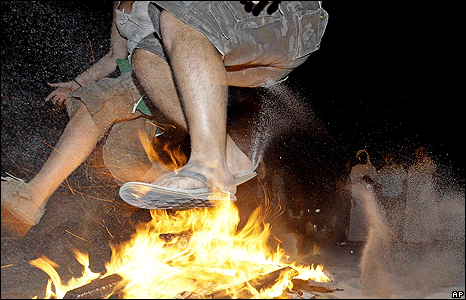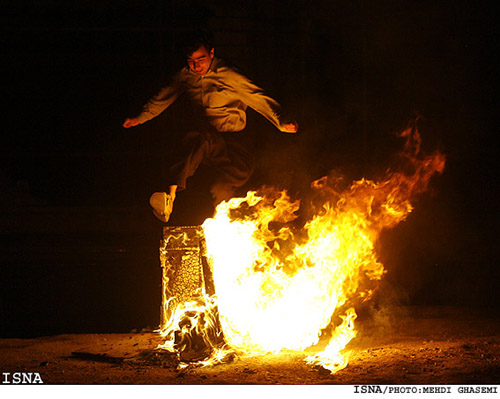
 |
Freethought & Rationalism ArchiveThe archives are read only. |
|
|
#31 | |
|
Veteran Member
Join Date: Jun 2010
Location: seattle, wa
Posts: 9,337
|
But is abstention from animal foods enough to associate Marcion with Empedocles as opposed to Pythagoras or some other teacher of vegetarianism? I don't think so. It would be only natural to associate Marcionites specifically with Empedocles if they engaged in a fire purification ritual. It would also explain why they were mistaken as dualists (= their interest in fire made them seem 'Zoroastrian'):
Quote:
|
|
|
|
|
|
#32 | |
|
Veteran Member
Join Date: Jun 2010
Location: seattle, wa
Posts: 9,337
|
Jaap Mansfeld (Heresiography in context: Hippolytus' Elenchos as a source for Greek Philosophy p 312) seems especially significant for my purposes:
Quote:
|
|
|
|
|
|
#33 | ||||||
|
Veteran Member
Join Date: Jun 2010
Location: seattle, wa
Posts: 9,337
|
 Some Clues About Christian Fire Worship in Against Celsus Book Six As most people are aware, Book Six Origen's treatise against the pagan critic Celsus deals with Celsus's description of the Christian mysteries. We can only learn about Celsus's original text by piecing together Origen's response which is rather tricky. Nevertheless it would be appear as if Celsus moved on from merely attacking the Christian religion's appeal to the lower classes to directly exposing the mysteries from the first words of this section: Quote:
Origen's reponse to Celsus's ridicule of the Christian doctrine is - as always - to appeal to the writings of Plato to prove that he held much the same thing: Quote:
So Origen, points to the same idea of the fire being 'enlightening' in the gospel: Quote:
Perhaps most interesting for our reconstruction of 'fire baptism' in Secret Mark is the fact that after a lengthy demonstration of what the true understanding of Plato would teach, Celsus argues that the gospel written by Mark (or perhaps 'the Gospel writer') stole all its/his ideas from Plato. The section Celsus uses to prove this is interesting the very section which precedes LGM 1 (= the section of Secret Mark cited in the Letter to Theodore): Quote:
Yet interestingly Celsus goes one step further and argues that the Christian mysteries which develop apparently from this section of text in Mark don't just appropriate ideas from Plato but also from the Persian mysteries. This clearly doesn't just mean 'nakedness' as just mentioned but also the sacred character of fire during what appears to be a ritually reenacted heavenly ascent. How does this all come together? It is difficult to say but it is clear that there was a diagram of the seven heavens, the understanding that an angel sat at each gate (= planet) and certain passwords were needed to get beyond each watcher. The initiates start at 'the earthly Jerusalem' which is presumed to be engulfed in fire and flames: Quote:
Quote:
 It is absolutely significant that Nowruz not only is a Persian fire jumping ritual but occurs on the first day of spring (which also happens to be the Persian New Year). The present day Coptic Church celebrates the very same day (i.e. New Year) as 'Nayrouz' - a fact which scholarship has never been able to explain. No serious study of the Nayrouz terminology has ever been able to deny the Persian connection. The difficulty of course is in establishing when the Alexandrian Church borrowed the terminology. These last photos are from Kurdish celebration of 'Newroz' 
|
||||||
|
|
|
|
#34 | |||||
|
Veteran Member
Join Date: Jun 2010
Location: seattle, wa
Posts: 9,337
|
More Clues to the Christian Fire Mysteries
 Origen continues in what follows referencing all the familiar Christian sacraments - i.e. bread, drink - but makes specific reference to 'testing by fire': Quote:
Quote:
Quote:
Quote:
Quote:
Clement of Alexandria has very different readings in his Alexandrian New Testament. It might be worth revisiting the Stromata to see what the fire ritual looks like there. |
|||||
|
|
|
|
#35 | |
|
Veteran Member
Join Date: Jun 2010
Location: seattle, wa
Posts: 9,337
|
Celsus's image of the Christian minister = God in Deuteronomy 33:
Quote:
|
|
|
|
|
|
#36 | |
|
Veteran Member
Join Date: Jun 2010
Location: seattle, wa
Posts: 9,337
|
Origen on what happens as the world is about to be consumed by fire:
Quote:
|
|
|
|
|
|
#37 | |
|
Veteran Member
Join Date: Jun 2010
Location: seattle, wa
Posts: 9,337
|
More from Celsus (and Origen's response) about the contemporary (Alexandrian) Christian doctrine of purification by fire:
Quote:
|
|
|
|
|
|
#38 | ||||
|
Veteran Member
Join Date: Jun 2010
Location: seattle, wa
Posts: 9,337
|
Origen Against Celsus Book Four
Quote:
Quote:
Quote:
Quote:
|
||||
|
|
|
|
#39 | |
|
Veteran Member
Join Date: Jun 2010
Location: seattle, wa
Posts: 9,337
|
Clement of Alexandria on fire purification
Quote:
|
|
|
|
|
|
#40 |
|
Veteran Member
Join Date: Jun 2010
Location: seattle, wa
Posts: 9,337
|
A former member of this board just posted what I consider to be the most likely explanation for the solution to fire baptism at my blog. Clive Durdle writes:
"In 2005 in a live demonstration on Greek television, Michael Kalopoulos, author and historian of religion, dipped three candles in white phosphorus. The candles spontaneously ignited after approximately 20 minutes due to the self-ignition properties of white phosphorus when in contact with air. According to Kalopoulos' website: If phosphorus is dissolved in an appropriate organic solvent, self-ignition is delayed until the solvent has almost completely evaporated. Repeated experiments showed that the ignition can be delayed for half an hour or more, depending on the density of the solution and the solvent employed. Kalopoulos also points out that knowledge of chemical reactions of this nature was well known in ancient times, quoting Strabo, who states "In Babylon there are two kinds of naphtha springs, a white and a black. The white naphtha is the one that ignites with fire." (Strabon Geographica 16.1.15.1-24) He further states that phosphorus was used by Chaldean magicians in the early fifth century BC, and by the ancient Greeks, in a way similar to its supposed use today by the Eastern Orthodox Patriarch of Jerusalem." I am too stupid to figure out how to post the youtube video demonstrations |
|
|
| Thread Tools | Search this Thread |
|